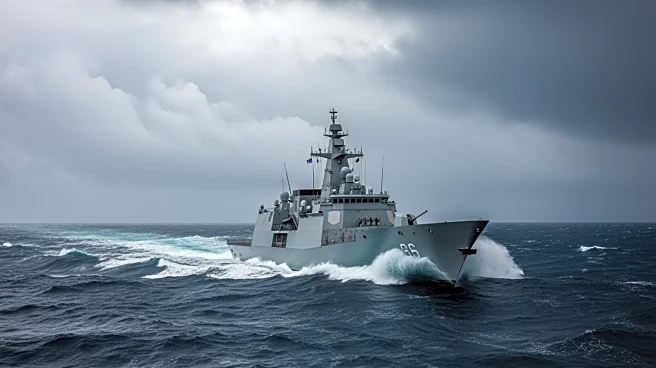What's Happening?
Venezuela has placed its military on full wartime alert, equipped with Russian air defenses and anti-ship missiles, following President Nicolás Maduro's declaration of a state of external emergency. This
development significantly alters the operational environment for the 10,000 U.S. troops deployed in the Caribbean, initially tasked with interdicting drug boats. Venezuela's military, though plagued by maintenance issues, has invested heavily in Russian-built systems capable of threatening U.S. ships and aircraft. The country operates Sukhoi Su-30 MK2 fighters armed with Kh-31 anti-ship missiles, and has positioned surface-to-air missile systems near strategic locations. Additionally, Venezuela has activated a militia claimed to be over 8 million strong, although experts question the number and training quality. This militia is designed to resist U.S. ground operations through asymmetric warfare tactics.
Why It's Important?
The heightened military alert in Venezuela presents a complex challenge for U.S. forces, who must now operate under the threat of Venezuelan retaliation. The presence of advanced Russian missile systems and a large militia complicates U.S. operations, which were originally focused on counternarcotics. The situation increases the risk of accidental conflict, as Venezuelan military exercises and provocative maneuvers near U.S. ships could lead to misinterpretations and escalation. The U.S. deployment lacks the logistics and troop levels necessary for sustained ground operations, highlighting the need for strategic adjustments. This development could impact U.S. foreign policy and military strategy in the region, as well as relations with Venezuela.
What's Next?
U.S. forces must navigate the challenges posed by Venezuela's military alert while maintaining their focus on counternarcotics operations. The Pentagon insists these operations remain law enforcement-focused, despite the military posture. The situation may require reinforcements and logistical support from the mainland U.S. to address potential escalations. The recent activation of Venezuela's militia and ongoing military exercises increase the likelihood of incidents that could lead to conflict. The U.S. may need to reassess its strategy and consider diplomatic avenues to mitigate tensions.
Beyond the Headlines
The militarization of civilian ports and daily exercises by Venezuela under Maduro's emergency decree blur the lines between law enforcement and military operations. The activation of the militia and deployment of advanced missile systems reflect Venezuela's strategy to deter U.S. intervention. The situation raises ethical and legal questions about the scope of U.S. operations in the region, particularly with the confirmation of CIA covert activities. The retirement of Adm. Alvin Holsey, amid tensions over the legality of operations, underscores the complexity of the U.S. military's role in the Caribbean.








